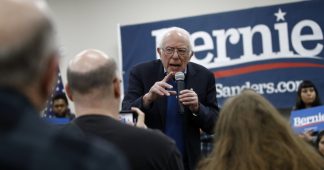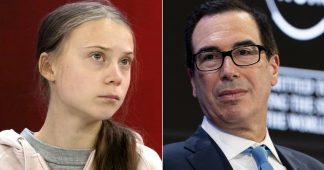One of the finalists in Joe Biden’s “veepstakes” is a longtime investor in fossil fuels, financial disclosures reveal.
By Walker Bragman
Aug 7, 2020
This report was written by Walker Bragman.
Former National Security Adviser Susan Rice, reportedly one of two finalists in Joe Biden’s vice presidential search, had millions invested in fossil fuels and energy companies as recently as 2015. The revelations come as Biden has faced renewed questions about his commitment to environmental policies that would combat climate change.
A financial disclosure form obtained by TMI reveals that Rice had investments in at least five such companies, including as much as $100,000 in TransCanada, which is behind the controversial Keystone XL pipeline. Rice also had over $1 million invested in pipeline firm Enbridge as well as more than $2 million split between fossil fuel companies Cenovus, Encana, and Imperial Oil — all companies with significant involvement in developing the tar sands of Alberta. The investments netted as much as $237,000 in dividends that year.
In addition, Rice reported significant holdings in Canadian banks which fund pipeline projects, according to the disclosure.
A veteran of multiple Democratic administrations, Rice has a traditionally impressive resume on paper. She worked as a consultant for McKinsey & Co. before serving as Assistant Secretary of State for African Affairs under Bill Clinton, UN Ambassador under Barack Obama and National Security Adviser. But her record has made her a controversial candidate for VP. Pledged delegates for Vermont Sen. Bernie Sanders have urged Biden to avoid naming her to the ticket, and have also urged him to remove a number of other foreign policy hawks from his team. Among other things, the delegates cited her past support for military intervention in Iraq, Libya, and Syria.
On Friday, environmental advocates criticized Rice’s past fossil fuel investments in a Politico report. In 2012, when Rice was a candidate to succeed Hillary Clinton as Secretary of State, environmentalists took aim at her for the holdings, even circulating a petition urging Obama not to select her.
Even then, Rice, whose net worth with her husband was estimated to be between $23.5 million and $43.5 million, had significant investments in Canadian energy interests, including as much as $600,000 in TransCanada. She also owned stock in Enbridge, Encana, Cenovus, and Suncor, along with other fossil fuel companies like Chesapeake Energy, Devon Energy, Royal Dutch Shell, Iberdrola, ATP Oil & Gas Corp., and energy utility TransAlta.
Rice would hardly be the first person with fossil fuel ties that Biden has brought onboard this cycle. Biden’s climate adviser, Heather Zichal, previously served on the board of a natural gas company, Cheniere Energy. One of his fundraisers, Andrew Goldman, co-founded a liquid natural gas company. Meanwhile, his national co-campaign chair, Louisiana Rep. Cedric Richmond, is a vocally pro fossil fuel Democrat. Topping the list, however, is fossil fuel lawyer and former Interior Secretary Ken Salazar, who Biden tapped to help with his Latino outreach.
Throughout the election cycle, Biden has attempted to thread a difficult needle, maintaining support from his big donors while assuaging the doubts of his party’s left flank — particularly on the issue of climate change.
During the primary, the former VP promised no new fracking on multiple occasions despite releasing a climate plan in June 2019 containing language explicitly allowing for “new oil and gas operations.” After the primary, Biden was quick to establish a policy task force with his former rival Sen. Bernie Sanders which led to him making a number of concessions on his climate plan.
But early last month, Biden walked back his previous statements on fracking, telling an interviewer that “fracking is not going to be on the chopping block.”
Andrew Perez contributed to this story. Photo: U.S. Institute of Peace / Wikimedia Commons.











